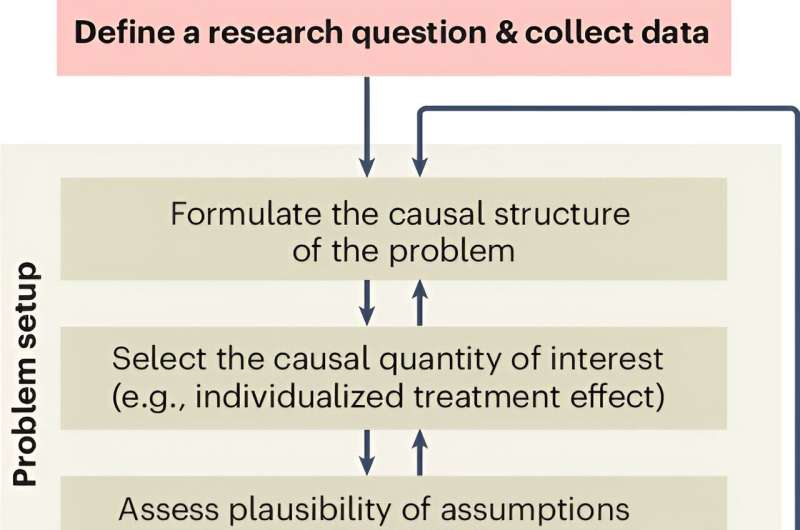This article has been reviewed according to Science X's editorial process and policies. Editors have highlighted the following attributes while ensuring the content's credibility:
fact-checked
peer-reviewed publication
trusted source
proofread
Training AI models to answer 'what if?' questions could improve medical treatments

Machines can learn not only to make predictions, but to handle causal relationships. An international research team shows how this could make medical treatments safer, more efficient, and more personalized.
Artificial intelligence techniques can be helpful for multiple medical applications, such as radiology or oncology, where the ability to recognize patterns in large volumes of data is vital. For these types of applications, the AI compares information against learned examples, draws conclusions, and makes extrapolations.
Now, an international team led by researchers from Ludwig-Maximilians-Universität München (LMU) and including researchers from the University of Cambridge, is exploring the potential of a comparatively new branch of AI for diagnostics and therapy.
The researchers found that causal machine learning (ML) can estimate treatment outcomes—and do so better than the machine learning methods generally used to date. Causal machine learning makes it easier for clinicians to personalize treatment strategies, which individually improves the health of patients.
The results, reported in the journal Nature Medicine, suggest how causal machine learning could improve the effectiveness and safety of a variety of medical treatments.
Classical machine learning recognizes patterns and discovers correlations. However, the principle of cause and effect remains closed to machines as a rule; they cannot address the question of why. When making therapy decisions for a patient, the 'why' is vital to achieve the best outcomes.
"Developing machine learning tools to address 'why?' and 'what if?' questions is empowering for clinicians, because it can strengthen their decision-making processes," said senior author Professor Mihaela van der Schaar, Director of the Cambridge Center for AI in Medicine. "But this sort of machine learning is far more complex than assessing personalized risk."
For example, when attempting to determine therapy decisions for someone at risk of developing diabetes, classical ML would aim to predict how probable it is for a given patient with a range of risk factors to develop the disease.
With causal ML, it would be possible to answer how the risk changes if the patient receives an anti-diabetes drug; that is, gauge the effect of a cause. It would also be possible to estimate whether metformin, the commonly-prescribed medication, would be the best treatment, or whether another treatment plan would be better.
To be able to estimate the effect of a hypothetical treatment, the AI models must learn to answer "what if?" questions. "We give the machine rules for recognizing the causal structure and correctly formalizing the problem," said Professor Stefan Feuerriegel from LMU, who led the research. "Then the machine has to learn to recognize the effects of interventions and understand, so to speak, how real-life consequences are mirrored in the data that has been fed into the computers."
Even in situations for which reliable treatment standards do not yet exist or where randomized studies are not possible for ethical reasons because they always contain a placebo group, machines could still gauge potential treatment outcomes from the available patient data and form hypotheses for possible treatment plans, so the researchers hope.
With such real-world data, it should generally be possible to describe the patient cohorts with ever greater precision in the estimates, bringing individualized therapy decisions that much closer. Naturally, there would still be the challenge of ensuring the reliability and robustness of the methods.
"The software we need for causal ML methods in medicine doesn't exist out of the box," says Professor Feuerriegel. "Rather, complex modeling of the respective problem is required, involving close collaboration between AI experts and doctors."
In other fields, such as marketing, explains Professor Feuerriegel, the work with causal ML has already been in the testing phase for some years now. "Our goal is to bring the methods a step closer to practice," he said. The paper describes the direction in which things could move over the coming years."
"I have worked in this area for almost 10 years, working relentlessly in our lab with generations of students to crack this problem," said Professor van der Schaar, who is affiliated with the Departments of Engineering, Applied Mathematics and Theoretical Physics, and Medicine.
"It's an extremely challenging area of machine learning, and seeing it come closer to clinical use, where it will empower clinicians and patients alike, is very satisfying."
Professor Van der Schaar is continuing to work closely with clinicians to validate these tools in diverse clinical settings, including transplantation, cancer and cardiovascular disease.
More information: Stefan Feuerriegel et al, Causal machine learning for predicting treatment outcomes, Nature Medicine (2024). DOI: 10.1038/s41591-024-02902-1



















